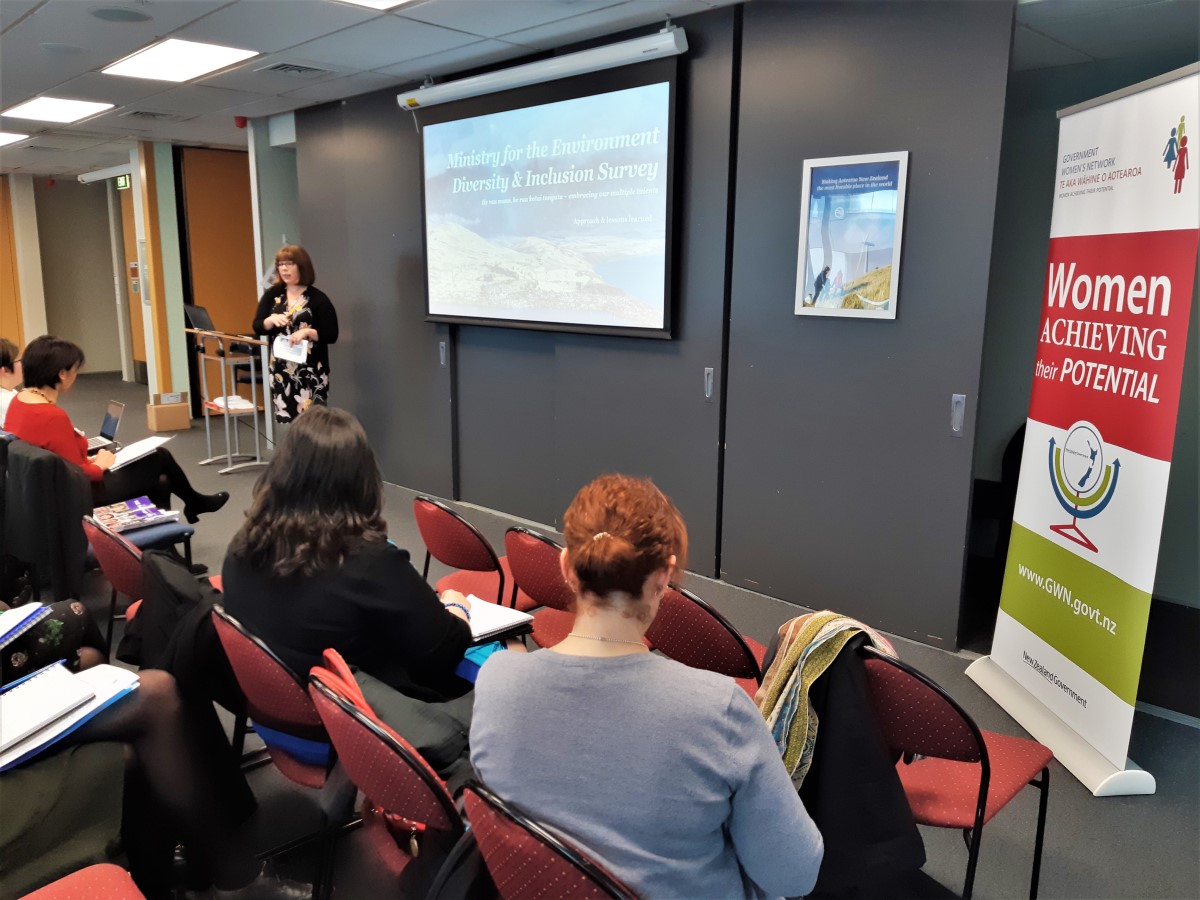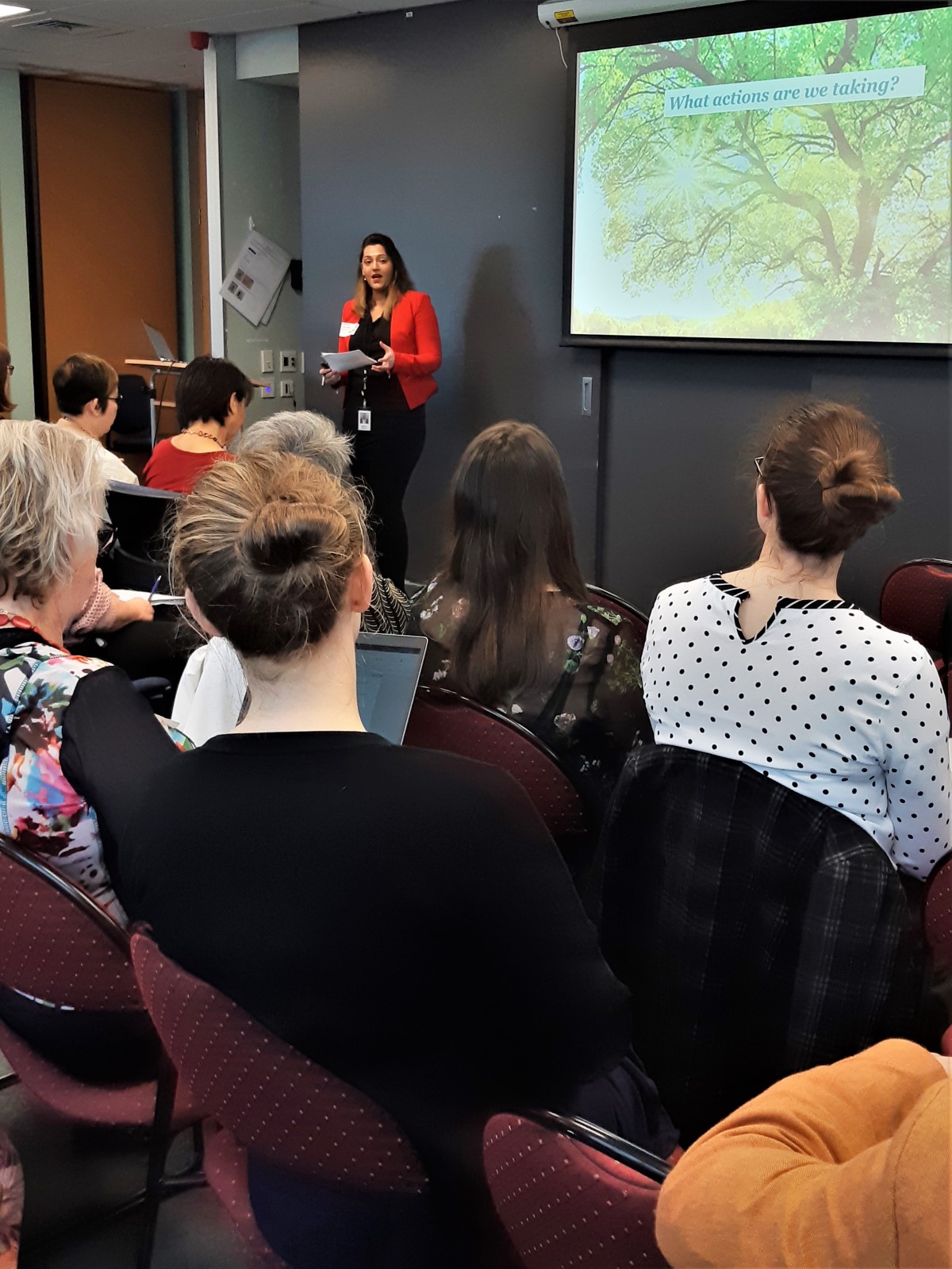MFE hosts Network Reps and insights on D&I surveys
The Ministry for the Environment’s Women’s Network were excited to host the Government Women’s Network Te Aka Wāhine o Aotearoa (GWN) quarterly Network Reps meeting on Tuesday 17 September.
Clodagh Jolly, co-lead for the MfE Women’s Network, welcomed the GWN attendees to MfE and introduced MfE Deputy Secretary for Partnerships and Customers, Anne Haira, who opened the session by sharing her own powerful story about how she was able to overcome the barriers of feeling marginalised as a woman, by building a strong network of wāhine around her who support and encourage her to speak up and be confident in her abilities.
Anne highlighted the importance of Women’s Networks to support each other in developing and growing as professionals and used the example of Greek Goddesses, such as Athena and Aphrodite, who were considered as being more powerful and influential than even some of their male counterparts.
Updates from GWN's Programme Director
Liz shared a number of updates about the network.
The GWN steering committee, which is chaired by Ruth Shinoda from Treasury, are revisiting the vision of the network.
Liz also noted that the calendar for next year is in development and invited members to think about topics for discussion at upcoming network reps meetings. She also shared information on Suffrage Day-related events that are happening all around the public sector, specifically the coffee catch-up at Home café from 12-1pm on Suffrage Day, 19 September.
Running a Diversity and Inclusion Survey – MFE shares its experiences
Clodagh Jolly, Apurva Mahire and Gordon Tan offered insights from their experiences designing and running a D&I survey at MfE.
They shared some of the 'hows' and 'whys' of running the survey, what the results showed, and key takeaways and actions to follow up the information that was collected. Some of the insights included:
- D&I is important to MfE because:
— it’s the right thing to do
— is key to increasing diversity of thinking and enabling high quality advice and solutions
— and makes your organisation a better place to work.
- The D&I survey itself was designed to demonstrate accountability and transparency and to measure insights, evidence and data to track progress towards the Ministry’s D&I goals. It also serves as a pulse check on the organisation’s overall work culture. MfE consulted with multiple internal as well as external stakeholders to design the survey.
- MfE took a broad approach to D&I, with a view towards addressing the intersectional nature of D&I. This meant including questions on people’s lived work experiences based not only on demographic categories such as ethnicity, gender and disability, but also on their ability to bring their whole selves to work with experiences around religious beliefs, sexual orientation, ethnicity and other indicators.
- Having a group of strongly committed individuals from diversity networks across MfE who want to be involved in the long-term implementation of D&I at their organisation is important. MfE also ensured that their People and Culture (HR) team was involved from the beginning, so that any results that were seen at the end could be actioned and embedded in HR policies, practices and processes. It is important to acknowledge that D&I is hard work and there will be some difficult conversations.
- Basing the work around the organisation’s D&I strategy allowed for leadership and managers to provide their strong backing and commitment, including advocating for it during the annual business planning and budgeting process to make it a part of BAU. MfE also linked back to the overall D&I work that is currently being undertaken, led by SSC, Naomi Ferguson at IR and previously by Gabriel Makhlouf from the Treasury.
- MfE is reviewing its recruitment and other HR policies and practices based on the results of the survey. This includes Unconscious Bias training both for staff as well as managers, as well as plans to ensure that our recruitment practices are focused on attracting and hiring diverse candidates. The leadership is also keen to set some measurable targets.
- The most important thing was to acknowledge that we are all at different stages on our D&I journey. The strong response rate of 150 staff indicated that there was genuine interest in D&I, and that people feel very engaged with the topic. MfE committed to sharing the findings in an open and honest way with all staff and leadership/management to ensure staff voices were heard.
- MfE will be sharing the survey questionnaire with all GWN members and are keen to help any organisation who might be thinking of running such a survey.






Download the MfE presentation to Network Reps
Download MfE's D&I survey questions
Follow up: actions taken from Jo Cribb workshop
Following from the previous quarterly Network Reps meeting and the workshop with NZ Police and Jo Cribb, agencies noted that some significant steps have been taken to address barriers for women in their agencies. MfE’s D&I work, and the Ministry of Health’s Speed Mentoring event were noted as two examples of progress.
Best ways for Network Reps to connect with each other
There was a significant discussion around how we connect as a network, focussing in particular on the GWN LinkedIn group. This is a closed group specifically aimed at women’s network reps (or those who are representing their agencies but not formal reps) to generate discussion and conversation around things such as sharing event information, future event topics, proposals for likely event speakers and panel members and opportunities around sharing spaces for such events.
There was interest in running a social media session to familiarise members with how to optimise the Linkedin group and other tools for connection.